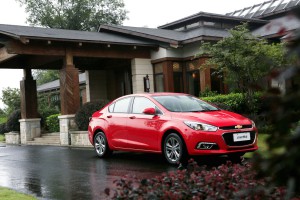When trade industry officials forecast that the Chinese automotive market would grow by about 7% to 8% this year much of the rest of the industry turned green with envy. But for China, that was a severe retrenchment after years of double-digit growth.
Now, it seems, even that forecast may have been too optimistic, however. Car sales began to slow down earlier this year, along with the rest of the country’s economy. But demand in recent weeks has taken a sharp plunge as the Chinese stock market shows signs of a full-fledged meltdown.
Though it remains the world’s largest new vehicle market, year-over-year sales fell 3.2% in June, according to the China Passenger Car Association, to a total of 1.43 million. That marked the country’s first down month since February 2013.
For the first half of 201, the Chinese market is still up 8.4%, but there’s growing concern momentum will continue to slip in the months ahead.
General Motors, the second-largest manufacturer in China, managed to eke out a 4.4% sales increase from January through June, though sales declined for the last three consecutive months. The situation might have been worse without the launch of key new products.
(For more on GM’s ups-and-downs in China, Click Here.)
Matt Tsien, the president of GM China, declared “an evolving mix” of products “essential” to keep momentum on the positive side. But the Detroit maker also resorted to aggressive price cutting of as much as 20% on 40 models.
Price cuts are not entirely unheard of. In the early years of the Chinese automotive boom, vehicles cost significantly more than in other global markets, in part due to hefty import duties. As competition increased, along with local production, manufacturers routinely made price cuts to build demand. But the pace of those reductions has intensified as the auto market has weakened this past year.
(With new Chinese plant coming, Jeep soon to manufacture SUVs on four continents. Click Here for the story.)
Industry leader Volkswagen AG, meanwhile, saw sales drop about 10% for the first half. The maker reportedly plans to provide about 1 billion yuan, or $161 million, to prop up some of its Chinese dealers marketing vehicles produced as part of VW’ joint venture with China FAW Group.
“Dealers are facing some hardships (and) based on current situation, we will surely help them out,” FAW-Volkswagen spokesman Li Pengcheg told the Bloomberg News Service.
Automotive retailers have been facing an increasingly tough time for the last year. In late 2014, reports surfaced indicating perhaps 70% of them were operating in the red.
Oddly enough, Chinese car sales apparently have been hurt by the stock market both coming and going. Industry analysts warned that many among China’s emerging middle class were saving money that might have gone into consumer purchases during the last year or two to invest it in the booming stock market.
“People are not buying cars, no matter how big the incentives. People want their money in the stock market,” Cui Dongshu, secretary general of China’s Passenger Car Association, told Bloomberg last month.
Now that Chinese stocks have lost a collective $3 trillion in value over the past month, many of those same consumers simply don’t have the money to invest in stocks – or cars – anymore.
(Global auto sales pace slowing down. Click Here for more.)


All of the major auto makers have used China sales to compensate for week sales in their home countries so this could be a serious set back if the drop continues.